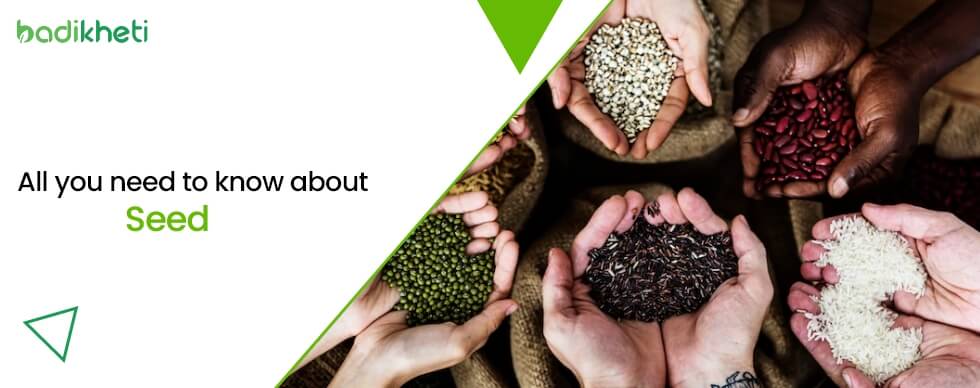
A seed is a portal to a new life for many plants. The importance of seeds in agriculture cannot be neglected. The gluten, after fertilization, turns into seeds. A seed coat and an embryo are inside the seeds. The embryo is made up of an embryonic axis, a radicle, and two cotyledons (wheat, maize) or one cotyledon (grams). A seed is the most important part of a crop. If the seed is good, the crop will be good so you should keep the quality of the seed as one of the top factors to consider while buying seeds online.
We at BadiKheti sell a wide variety of seeds online and thought about shedding some light on the types of seeds available in India.
Before you buy seeds online in India, having knowledge about the various classes of seeds available in the country is always beneficial. Normally the seeds are classified as;
The International Crop Improvement Association, on the other hand, classifies seeds into the following classes.
Let’s have a look at them.
Such seeds are produced from nucleus seeds at an Agricultural University. It may be monitored by a joint inspection team of scientists and officials from certification agencies who monitor the production process.
Seeds of this type are known as nucleus seeds, and plant breeders must supervise their production. They possess all of the required genetic traits, and it’s possible to regularly practice mass selection to ensure they retain all the desired qualities.
Such seeds have high genetic value, and because of their tiny quantities, they are expensive. Breeder seed is used to produce foundation seed.
The tag color of the breeder seeds is Yellow.
A mother seed is also known as a foundation seed because it’s responsible for providing seeds for other types of certified plants. Such seeds are produced by the State Farm Corporation of India, National Seed Corporation (NSC), and State seed Corporation under technical guidance by qualified plant breeders or research scientists.
Foundation seeds have White tags.
A registered seed may be produced from a foundation seed or another certified seed, or another registered seed itself. Its production is supervised by the certification agency. It has satisfactory genetic value and purity.
Such seeds are omitted in India, and thus, registered seeds are produced directly from foundation seeds.
Registered seeds have a Purple tag.
Certified seeds can be the progeny of foundation or registered seeds, each of which has to meet certain quality standards. Their production is supervised by an approved state seed certification agency.
The seed of this class is normally produced by the State and National Seeds Corporations and Private Seed companies on the farms of progressive growers. This is the commercial seed that the seed company sells to farmers for commercial crop production. Hence it is mandatory to maintain the purity of these seeds at 99 percent.
The color tag of the Certified seed is Blue.
As now you understand the different types of seeds buying the one that you are looking for becomes easy.
Badikheti is the best place to buy cheap agricultural seeds in India. We have premium quality seeds from top seeds manufacturers, wholesalers, exporters and distributors. Whether you want organic seeds or non-organic ones, buy the best quality seeds from us and experience a bumper harvest.
Onion seed cultivation holds paramount importance in the agricultural sector of India, owing to the indispensable role onions hold in the country's gastronomic heritage. Nonetheless, onion seed cultivation requires utter attention and there are several factors that can significantly affect the output and excellence of onion seeds. The present article examines the notable hurdles confronting Indian farmers involved in onion seed cultivation and offers creative approaches to surmount these challenges. Climate volatility India's varied geography gives rise to a diverse range of climate zones, which...
Growing chillies (Mirch) can be extremely rewarding for any farmer in India. The satisfaction of harvesting large, plump mirchi is unparalleled. However, proper sowing techniques are crucial right from the start to ensure a successful crop. This beginner's guide will walk you through optimal chilli seed sowing depths and best practices for your Indian farms. Choosing the Right Chilli Seeds The first step is selecting high-quality, viable seeds of the chilli varieties you want to grow. Popular choices like lal mirch (red chilli), hari mirch...
India is the second largest producer of onions in the world after China. The onion, also known as 'pyaaz', is an indispensable part of Indian cuisine and is used in most curries, gravies, snacks, and condiments. Selecting the right onion seed variety from authentic online agriculture ecommerce store like Badikheti suited for the regional climate is crucial for good yields and quality produce. Here are some tips on choosing onion seed varieties for different parts of India: North Indian Plains The Indo-Gangetic plains have extremely...